#American industry
Text
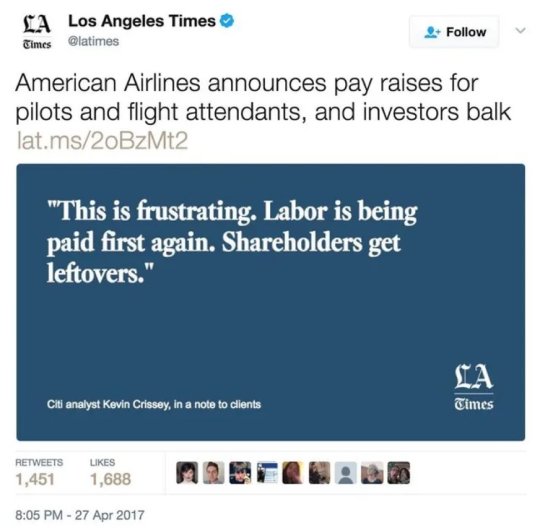

#american airlines#capitalism#democrats#republicans#politics#corporate/industrial news#the simpsons#lol#twitter#wall street
23K notes
·
View notes
Text
WHEN WHEN WE HAD INDUSTRY
WHEN WHEN WE HAD INDUSTRY
Living as we do in the valley where America birthed its own (100 years after they had done it all over Europe and England) industry, we can see what remains of the mills and factories that were formerly here.
This is what remains of Bernat Mills. It burnt to the ground July 21, 2007. It was wood except for that brick entry. I still remember the fire because the mill burned for a month and…

View On WordPress
0 notes
Text
no ai generated content will ever compare to the absolutely cartoonishly evil plot to cut down trees to prevent workers from striking to get livable wage.
#tree law#sag strike#wga strike#also also it can be hard to admit but the US does set some industry standards so although im on the other side of the world its concerning!!#if bigwigs at US companies are screwing out their own workers what would this mean for those producing content in other countries?#what about our own local production companies that model american production houses?#oh we cant pay you a living wage cause thats industry standard. dont believe me? here is what a writer at X USA company at X TV show earns#also if you “cant afford” to pay your creatives a living wage then maybe you shouldnt be in charge#so yeah#i think this whole strike thing will affect more than just the US#just fucking pay your creatives
4K notes
·
View notes
Text
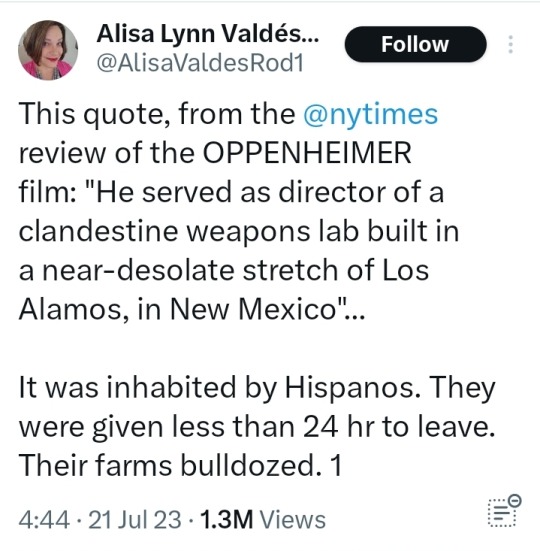
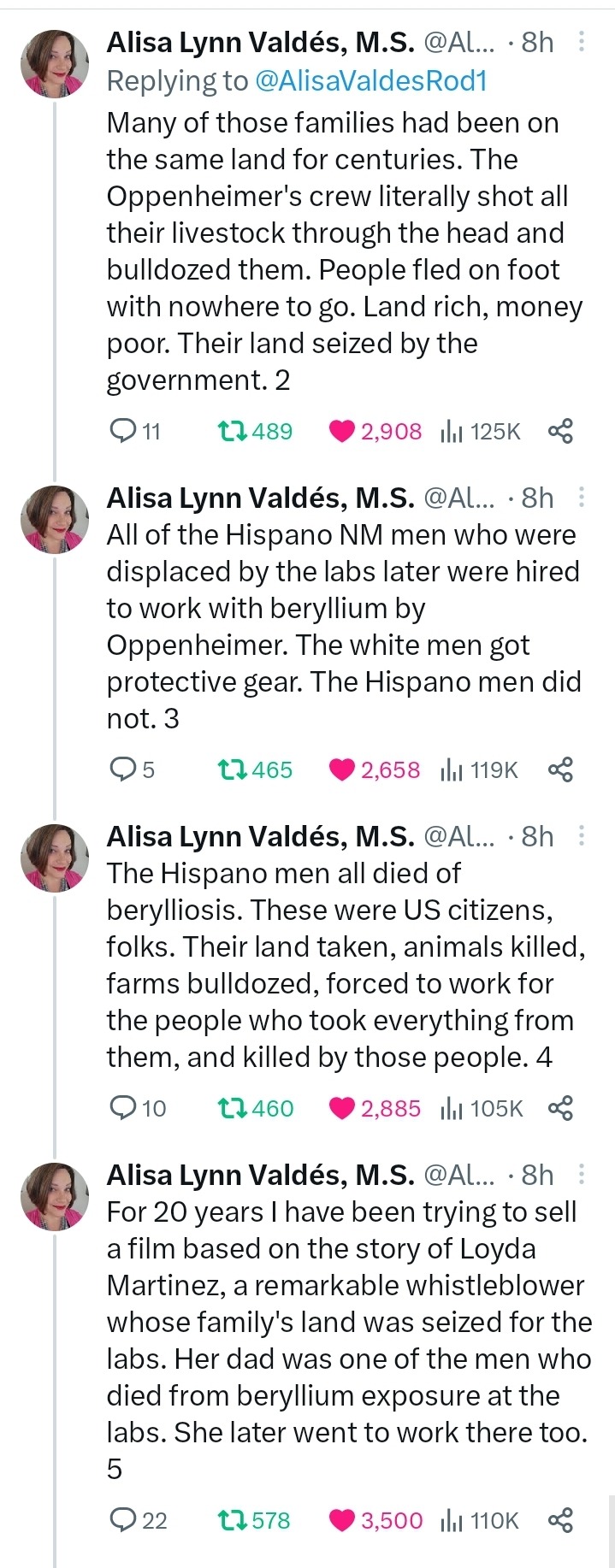

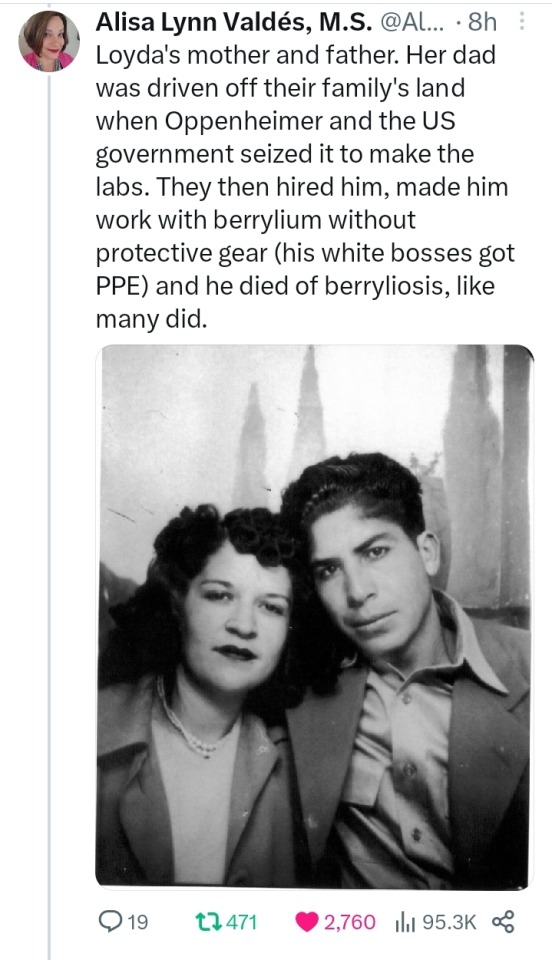
youtube
(alt included in all images)
Another thread by Senator Ben Ray Luján here.
A book on the subject (haven't read it myself):
One of the sources in another one of Alisa's furiously impassioned twitter threads have been debunked, so I didn't include that. But she claims that her own family was caught in the fallout zone when her mother was a baby, which eventually led to her and large numbers of her community developing cancer. It's human for that kind of grief to be caught up in inaccuracies. People are already being ghastly and racist to Hispanos and Indigenous people criticizing the hype for the movie. They're not attacking Oppenheimer for being Jewish, they're criticising the erasure of the human cost of these bombs and the continued valorisation of the U.S military's actions in World War II as some kind of moral saviourism.
While Oppenheimer himself believed that the nuclear bombings of Hiroshima and Nagasaki were morally justified (they had planned to drop them on Germany except they surrendered before they could), he also felt had blood on his hands and regretted his role as the "Father of the Atomic Bomb". He spent the rest of his career vehemently opposing further development of thermonuclear weapons and the hydrogen bomb accurately predicting the concept of mutually assured destruction. This eventually made him a victim of Senator McCarthy's Red Scare and his clearance was revoked. I haven't seen the movie (Christopher Nolan is the kind of casual white racist I avoid on principle) but people who have seen it say that it doesn't glorify nuclear weapons and depicts the man himself with the complex moral nuance that seems to be accurately reflective of his real life.
The backlash to Indigenous and Hispanos people's criticisms and to people pointing out that Hiroshima and Nagasaki were genocides is also frustrating because...both world wars were a clash of genocidal empires. The reason they were world wars is because the countries colonized by Japan, China, the European powers and the US were all dragged into it, whether they wanted to or not. Jews were one of the many colonized peoples that suffered in that time, who were left to die by everyone until they could be used to frame the Allied powers as moral saviours, establishing a revisionist nostalgia for heroism that powers the US military industrial complex to this day.
As early as May 1942, and again in June, the BBC reported the mass murder of Polish Jews by the Nazis. Although both US President, Franklin Roosevelt, and British Prime Minister, Winston Churchill, warned the Germans that they would be held to account after the war, privately they agreed to prioritise and to turn their attention and efforts to winning the war. Therefore, all pleas to the Allies to destroy the death camp at Auschwitz-Birkenau were ignored. The Allies argued that not only would such an operation shift the focus away from winning the war, but it could provoke even worse treatment of the Jews. In June 1944 the Americans had aerial photographs of the Auschwitz complex. The Allies bombed a nearby factory in August, but the gas chambers, crematoria and train tracks used to transport Jewish civilians to their deaths were not targeted.
(Source)
Uncritical consumption of World War II media is the reinforcement of imperialist propaganda, more so when one group of colonized people is used to silence other colonized peoples. Pitting white Jewry against BIPOC is to do the work of white supremacy for imperialist colonizers, and victimizes Jews of colour twice over.
Edit: friends, there's been some doubt cast on the veracity of Alisa's claims. The human cost to the Hispanos population caught downwind of the nuclear tests is very real, as was land seizure without adequate compensation. However, there's no record I can yet find about Los Alamos killing livestock and Hispanos being forced to work for Los Alamos without PPE. There is a separate issue about human testing in the development of said PPE that's not covered here. I'm turning off reblogs until I can find out more. Meanwhile, here's another more legitimate article you can boost instead:
#Youtube#colonialism#colonization#genocide#oppenheimer#nuclear war#nuclear testing#indigenous rights#racism#new mexico#american imperialism#world war ii#hispanos#tw: animal cruelty#loyda martinez#white supremacy#military industrial complex#generational trauma#worker exploitation#colonial trauma#hiroshima#nagasaki#war propaganda#knee of huss#twitter
870 notes
·
View notes
Photo








Harvesting and loading ice. The horse is wearing skates.
Colorado, ca. 1900-1906.
430 notes
·
View notes
Text


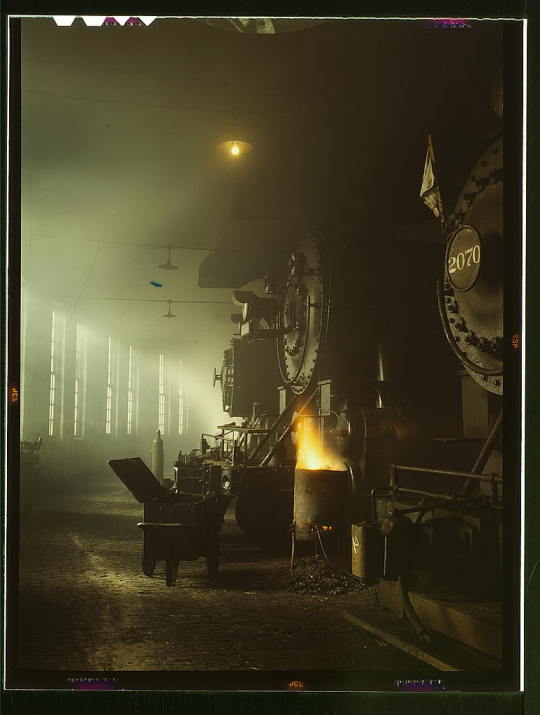



Otherworldly industrial scenes from the Chicago and North Western Railroad's Proviso yard, Chicago, Illinois, 1942-1943
2K notes
·
View notes
Text
The CHIPS Act treats the symptoms, but not the causes
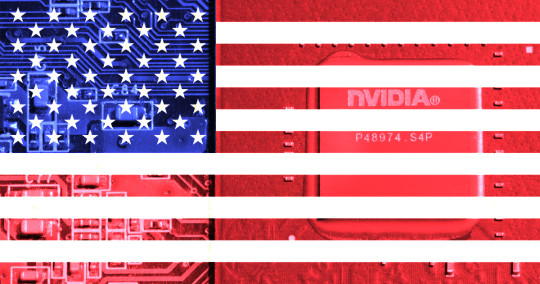
If you'd like an essay-formatted version of this post to read or share, here's a link to it on pluralistic.net, my surveillance-free, ad-free, tracker-free blog:
https://pluralistic.net/2024/02/07/farewell-mr-chips/#we-used-to-make-things

There's this great throwaway line in 1992's Sneakers, where Dan Aykroyd, playing a conspiracy-addled hacker/con-man, is feverishly telling Sydney Poitier (playing an ex-CIA spook) about a 1958 meeting Eisenhower had with aliens where Ike said, "hey, look, give us your technology, and we'll give you all the cow lips you want."
Poitier dismisses Aykroyd ("Don't listen to this man. He's certifiable"). We're meant to be on Poitier's side here, but I've always harbored some sympathy for Aykroyd in this scene.
That's because I often hear echoes of Aykroyd's theory in my own explanations of the esoteric bargains and plots that produced the world we're living in today. Of course, in my world, it's not presidents bargaining for alien technology in exchange for cow-lips – it's the world's wealthy nations bargaining to drop trade restrictions on the Global South in exchange for IP laws.
These bargains – which started as a series of bilateral and then multilateral agreements like NAFTA, and culminated in the WTO agreement of 1999 – were the most important step in the reordering of the world's economy around rent-extraction, cheap labor exploitation, and a brittle supply chain that is increasingly endangered by the polycrisis of climate and its handmaidens, like zoonotic plagues, water wars, and mass refugee migration.
Prior to the advent of "free trade," the world's rich countries fashioned debt into a whip-hand over poor, post-colonial nations. These countries had been bankrupted by their previous colonial owners, and the price of their freedom was punishing debts to the IMF and other rich-world institutions in exchange for loans to help these countries "develop."
Like all poor debtors, these countries were said to have gotten into their predicament through moral failure – they'd "lived beyond their means."
(When rich people get into debt, bankruptcy steps in to give them space to "restructure" according to their own plans. When poor people get into debt, bankruptcy strips them of nearly everything that might help them recover, brands them with a permanent scarlet letter, and subjects them to humiliating micro-management whose explicit message is that they are not competent to manage their own affairs):
https://pluralistic.net/2021/08/07/hr-4193/#shoppers-choice
So the poor debtor nations were ordered to "deregulate." They had to sell off their state assets, run their central banks according to the dictates of rich-world finance authorities, and reorient their production around supplying raw materials to rich countries, who would process these materials into finished goods for export back to the poor world.
Naturally, poor countries were not allowed to erect "trade barriers" that might erode the capacity of this North-South transfer of high-margin goods, but this was not the era of free trade. It wasn't the free trade era because, while the North-South transfer was largely unrestricted, the South-North transfer was subject to tight regulation in the rich world.
In other words, poor countries were expected to export, say, raw ore to the USA and reimport high-tech goods, with low tariffs in both directions. But if a poor country processed that ore domestically and made its own finished goods, the US would block those goods at the border, slapping them with high tariffs that made them more expensive than Made-in-the-USA equivalents.
The argument for this unidirectional trade was that the US – and other rich countries – had a strategic need to maintain their manufacturing industries as a hedge against future geopolitical events (war, but also pandemics, extreme weather) that might leave the rich world unable to provide for itself. This rationale had a key advantage: it was true.
A country that manages its own central bank can create as much of its own currency as it wants, and use that money to buy anything for sale in its own currency.
This may not be crucial while global markets are operating to the country's advantage (say, while the rest of the world is "willingly" pricing its raw materials in your country's currency), but when things go wrong – war, plague, weather – a country that can't make things is at the rest of the world's mercy.
If you had to choose between being a poor post-colonial nation that couldn't supply its own technological needs except by exporting raw materials to rich countries, and being a rich country that had both domestic manufacturing capacity and a steady supply of other countries' raw materials, you would choose the second, every time.
What's not to like?
Here's what.
The problem – from the perspective of America's ultra-wealthy – was that this arrangement gave the US workforce a lot of power. As US workers unionized, they were able to extract direct concessions from their employers through collective bargaining, and they could effectively lobby for universal worker protections, including a robust welfare state – in both state and federal legislatures. The US was better off as a whole, but the richest ten percent were much poorer than they could be if only they could smash worker power.
That's where free trade comes in. Notwithstanding racist nonsense about "primitive" countries, there's no intrinsic defect that stops the global south from doing high-tech manufacturing. If the rich world's corporate leaders were given free rein to sideline America's national security in favor of their own profits, they could certainly engineer the circumstances whereby poor countries would build sophisticated factories to replace the manufacturing facilities that sat behind the north's high tariff walls.
These poor-country factories could produce goods ever bit as valuable as the rich world's shops, but without the labor, environmental and financial regulations that constrained their owners' profits. They slavered for a business environment that let them kill workers; poison the air, land and water; and cheat the tax authorities with impunity.
For this plan to work, the wealthy needed to engineer changes in both the rich world and the poor world. Obviously, they would have to get rid of the rich world's tariff walls, which made it impossible to competitively import goods made in the global south, no matter how cheaply they were made.
But free trade wasn't just about deregulation in the north – it also required a whole slew of new, extremely onerous regulations in the global south. Corporations that relocated their manufacturing to poor – but nominally sovereign – countries needed to be sure that those countries wouldn't try to replicate the American plan of becoming actually sovereign, by exerting control over the means of production within their borders.
Recall that the American Revolution was inspired in large part by fury over the requirement to ship raw materials back to Mother England and then buy them back at huge markups after they'd been processed by English workers, to the enrichment of English aristocrats. Post-colonial America created new regulations (tariffs on goods from England), and – crucially – they also deregulated.
Specifically, post-revolutionary America abolished copyrights and patents for English persons and firms. That way, American manufacturers could produce sophisticated finished goods without paying rent to England's wealthy making those goods cheaper for American buyers, and American publishers could subsidize their editions of American authors' books by publishing English authors on the cheap, without the obligation to share profits with English publishers or English writers.
The surplus produced by ignoring the patents and copyrights of the English was divided (unequally) among American capitalists, workers, and shoppers. Wealthy Americans got richer, even as they paid their workers more and charged less for their products. This incubated a made-in-the-USA edition of the industrial revolution. It was so successful that the rest of the world – especially England – began importing American goods and literature, and then American publishers and manufacturers started to lean on their government to "respect" English claims, in order to secure bilateral protections for their inventions and books in English markets.
This was good for America, but it was terrible for English manufacturers. The US – a primitive, agricultural society – "stole" their inventions until they gained so much manufacturing capacity that the English public started to prefer American goods to English ones.
This was the thing that rich-world industrialists feared about free trade. Once you build your high-tech factories in the global south, what's to stop those people from simply copying your plans – or worse, seizing your factories! – and competing with you on a global scale? Some of these countries had nominally socialist governments that claimed to explicitly elevate the public good over the interests of the wealthy. And all of these countries had the same sprinkling of sociopaths who'd gladly see a million children maimed or the land poisoned for a buck – and these "entrepreneurs" had unbeatable advantages with their countries' political classes.
For globalization to work, it wasn't enough to deregulate the rich world – capitalists also had to regulate the poor world. Specifically, they had to get the poor world to adopt "IP" laws that would force them to willingly pay rent on things they could get for free: patents and other IP, even though it was in the short-term, medium-term, and long-term interests of both the nation and its politicians and its businesspeople.
Thus, the bargain that makes me sympathetic to Dan Aykroyd: not cow lips for alien tech; but free trade for IP law. When the WTO was steaming towards passage in the late 1990s, there was (rightly) a lot of emphasis on its deregulatory provisions: weakening of labor, environmental and financial laws in the poor world, and of tariffs in the rich world.
But in hindsight, we all kind of missed the main event: the TRIPS (Agreement on Trade-Related Aspects of Intellectual Property Rights). This actually started before the WTO treaty (it was part of the GATT, a predecessor to the WTO), but the WTO spread it to countries all over the world. Under the TRIPS, poor countries are required to honor the IP claims of rich countries, on pain of global sanction.
That was the plan: instead of paying American workers to make Apple computers, say, Apple could export the "IP" for Macs and iPhones to countries like China, and these countries would produce Apple products that were "designed in California, assembled in China." China would allow Apple to treat Chinese workers so badly that they routinely committed suicide, and would lock up or kill workers who tried to unionize. China would accept vast shipments of immortal, toxic e-waste. And China wouldn't let its entrepreneurs copy Apple's designs, be they software, schematics or trademarks.
Apple isn't the only company that pursued this strategy, but no company has executed it as successfully. It's not for nothing that Steve Jobs's hand-picked successor was Tim Cook, who oversaw the transfer of even the most exacting elements of Apple manufacturing to Chinese facilities, striking bargains with contractors like Foxconn that guaranteed that workers would be heavily – lethally! – surveilled and controlled to prevent the twin horrors of unionization and leaks.
For the first two decades of the WTO era, the most obvious problems with this arrangement was wage erosion (for American workers) and leakage (for the rich). China's "socialist" government was only too happy to help Foxconn imprison workers who demanded better wages and working conditions, but they were far more relaxed about knockoffs, be they fake iPods sold in market stalls or US trade secrets working their way into Huawei products.
These were problems for the American aristocracy, whose investments depended on China disciplining both Chinese workers and Chinese businesses. For the American people, leakage was a nothingburger. Apple's profits weren't shared with its workforce beyond the relatively small number of tech workers at its headquarters. The vast majority of Apple employees, who flogged iPhones and scrubbed the tilework in gleaming white stores across the nation, would get the same minimal (or even minimum) wage no matter how profitable Apple grew.
It wasn't until the pandemic that the other shoe dropped for the American public. The WTO arrangement – cow lips for alien technology – had produced a global system brittle supply chains composed entirely of weakest links. A pandemic, a war, a ship stuck in the Suez Canal or Houthi paramilitaries can cripple the entire system, perhaps indefinitely.
For two decades, we fought over globalization's effect on wages. We let our corporate masters trick us into thinking that China's "cheating" on IP was a problem for the average person. But the implications of globalization for American sovereignty and security were banished to the xenophobic right fringe, where they were mixed into the froth of Cold War 2.0 nonsense. The pandemic changed that, creating a coalition that is motivated by a complex and contradictory stew of racism, environmentalism, xenophobia, labor advocacy, patriotism, pragmatism, fear and hope.
Out of that stew emerged a new American political tendency, mostly associated with Bidenomics, but also claimed in various guises by the American right, through its America First wing. That tendency's most visible artifact is the CHIPS Act, through which the US government proposes to use policy and subsidies to bring high-tech manufacturing back to America's shores.
This week, the American Economic Liberties Project published "Reshoring and Restoring: CHIPS Implementation for a Competitive Semiconductor Industry," a fascinating, beautifully researched and detailed analysis of the CHIPS Act and the global high-tech manufacturing market, written by Todd Achilles, Erik Peinert and Daniel Rangel:
https://www.economicliberties.us/our-work/reshoring-and-restoring-chips-implementation-for-a-competitive-semiconductor-industry/#
Crucially, the report lays out the role that the weakening of antitrust, the dismantling of tariffs and the strengthening of IP played in the history of the current moment. The failure to enforce antitrust law allowed for monopolization at every stage of the semiconductor industry's supply-chain. The strengthening of IP and the weakening of tariffs encouraged the resulting monopolies to chase cheap labor overseas, confident that the US government would punish host countries that allowed their domestic entrepreneurs to use American designs without permission.
The result is a financialized, "capital light" semiconductor industry that has put all its eggs in one basket. For the most advanced chips ("leading-edge logic"), production works like this: American firms design a chip and send the design to Taiwan where TSMC foundry turns it into a chip. The chip is then shipped to one of a small number of companies in the poor world where they are assembled, packaged and tested (AMP) and sent to China to be integrated into a product.
Obsolete foundries get a second life in the commodity chip ("mature-node chips") market – these are the cheap chips that are shoveled into our cars and appliances and industrial systems.
Both of these systems are fundamentally broken. The advanced, "leading-edge" chips rely on geopolitically uncertain, heavily concentrated foundries. These foundries can be fully captured by their customers – as when Apple prepurchases the entire production capacity of the most advanced chips, denying both domestic and offshore competitors access to the newest computation.
Meanwhile, the less powerful, "mature node" chips command minuscule margins, and are often dumped into the market below cost, thanks to subsidies from countries hoping to protect their corner of the high-tech sector. This makes investment in low-power chips uncertain, leading to wild swings in cost, quality and availability of these workhorse chips.
The leading-edge chipmakers – Nvidia, Broadcom, Qualcomm, AMD, etc – have fully captured their markets. They like the status quo, and the CHIPS Act won't convince them to invest in onshore production. Why would they?
2022 was Broadcom's best year ever, not in spite of its supply-chain problems, but because of them. Those problems let Broadcom raise prices for a captive audience of customers, who the company strong-armed into exclusivity deals that ensured they had nowhere to turn. Qualcomm also profited handsomely from shortages, because its customers end up paying Qualcomm no matter where they buy, thanks to Qualcomm ensuring that its patents are integrated into global 4G and 5G standards.
That means that all standards-conforming products generate royalties for Qualcomm, and it also means that Qualcomm can decide which companies are allowed to compete with it, and which ones will be denied licenses to its patents. Both companies are under orders from the FTC to cut this out, and both companies ignore the FTC.
The brittleness of mature-node and leading-edge chips is not inevitable. Advanced memory chips (DRAM) roughly comparable in complexity to leading-edge chips, while analog-to-digital chips are as easily commodified as mature-node chips, and yet each has a robust and competitive supply chain, with both onshore and offshore producers. In contrast with leading-edge manufacturers (who have been visibly indifferent to the CHIPS incentives), memory chip manufacturers responded to the CHIPS Act by committing hundreds of billions of dollars to new on-shore production facilities.
Intel is a curious case: in a world of fabless leading-edge manufacturers, Intel stands out for making its own chips. But Intel is in a lot of trouble. Its advanced manufacturing plans keep foundering on cost overruns and delays. The company keeps losing money. But until recently, its management kept handing its shareholders billions in dividends and buybacks – a sign that Intel bosses assume that the US public will bail out its "national champion." It's not clear whether the CHIPS Act can save Intel, or whether financialization will continue to hollow out a once-dominant pioneer.
The CHIPS Act won't undo the concentration – and financialization – of the semiconductor industry. The industry has been awash in cheap money since the 2008 bailouts, and in just the past five years, US semiconductor monopolists have paid out $239b to shareholders in buybacks and dividends, enough to fund the CHIPS Act five times over. If you include Apple in that figure, the amount US corporations spent on shareholder returns instead of investing in capacity rises to $698b. Apple doesn't want a competitive market for chips. If Apple builds its own foundry, that just frees up capacity at TSMC that its competitors can use to improve their products.
The report has an enormous amount of accessible, well-organized detail on these markets, and it makes a set of key recommendations for improving the CHIPS Act and passing related legislation to ensure that the US can once again make its own microchips. These run a gamut from funding four new onshore foundries to requiring companies receiving CHIPS Act money to "dual-source" their foundries. They call for NIST and the CPO to ensure open licensing of key patents, and for aggressive policing of anti-dumping rules for cheap chips. They also seek a new law creating an "American Semiconductor Supply Chain Resiliency Fee" – a tariff on chips made offshore.
Fundamentally, these recommendations seek to end the outsourcing made possible by restrictive IP regimes, to undercut Wall Street's power to demand savings from offshoring, and to smash the market power of companies like Apple that make the brittleness of chip manufacturing into a feature, rather than a bug. This would include a return to previous antitrust rules, which limited companies' ability to leverage patents into standards, and to previous IP rules, which limited exclusive rights chip topography and design ("mask rights").
All of this will is likely to remove the constraints that stop poor countries from doing to America the same things that postcolonial America did to England – that is, it will usher in an era in which lots of countries make their own chips and other high-tech goods without paying rent to American companies. This is good! It's good for poor countries, who will have more autonomy to control their own technical destiny. It's also good for the world, creating resiliency in the high-tech manufacturing sector that we'll need as the polycrisis overwhelms various places with fire and flood and disease and war. Electrifying, solarizing and adapting the world for climate resilience is fundamentally incompatible with a brittle, highly concentrated tech sector.
Pluralizing high-tech production will make America less vulnerable to the gamesmanship of other countries – and it will also make the rest of the world less vulnerable to American bullying. As Henry Farrell and Abraham Newman describe so beautifully in their 2023 book Underground Empire, the American political establishment is keenly aware of how its chokepoints over global finance and manufacturing can be leveraged to advantage the US at the rest of the world's expense:
https://pluralistic.net/2023/10/10/weaponized-interdependence/#the-other-swifties
Look, I know that Eisenhower didn't trade cow-lips for alien technology – but our political and commercial elites really did trade national resiliency away for IP laws, and it's a bargain that screwed everyone, except the one percenters whose power and wealth have metastasized into a deadly cancer that threatens the country and the planet.

Image:
Mickael Courtiade (modified)
https://www.flickr.com/photos/197739384@N07/52703936652/
CC BY 2.0
https://creativecommons.org/licenses/by/2.0/
#pluralistic#chips act#ip#monopolies#antitrust#national security#industrial policy#american economic liberties project#tmsc#leading-edge#intel#mature node#lagging edge#foundries#fabless
251 notes
·
View notes
Text

Paul Nagy — Wall Safe "Gold" (mirror polished stainless steel, acrylic castings, 2021)
186 notes
·
View notes
Text

North American F-82Es Twin Mustang With External Tanks, 1948. ➤➤ LEARN MORE: https://youtu.be/8Qzp65KF7Fs
➤➤HD IMAGE: https://dronescapes.video/F82
#f-82#Twin Mustang#youtube#aircraft#airplane#aviation#dronescapes#military#documentary#aviation history#ww2#wwii#North american#aviation pioneer#aviation photography#aviation industry#plane#military plane#military aircraft#military history
111 notes
·
View notes
Text


12.24.2023
111 notes
·
View notes
Text
""That's right, pal," says Number Seven. "And take it in these shops. If they'd even teach a guy a trade - make him learn a trade you wouldn't mind. Then a guy would have something to fall back on if he felt like hitting the straight and narrow. But what do they do? They put you to work making automobile plates, or something that's only done in prisons; stuff you couldn't get a job at outside if you wanted to; and the machinery is all twenty years out of date; and the instructors don't know anything about up-to-date methods; and the materials you get to work with are so lousy that you can't learn to do decent work even if you want to. Here I am. I've been working in the shoeshop for five years. What good will that do me? In the first place, the work I'm doing is done by women and children outside; it don't pay any- thing; and if I tried to get away with the lousy kind of work I've been taught to do, I wouldn't last two hours in an outside shop. The print shop is the only shop in here where a guy could learn a decent trade; but Christ, there's only room for forty guys in that shop, and you have to be a high-school graduate to get in there. That don't do the rest of us any good. There's a thousand men here, and only room for forty or so over in the print shop. And not only that, but So-and-So was always threatening to close the print shop because it didn't show enough profits. That's all they think about here. They damn about us learning a trade; all they is having the industries show a profit!"
"And take a guy when he gets out of here," says Number Ten. "Times are lousy outside. Even guys who know their trades, guys that can get swell references, can't get a job nowadays. And if they can't get work, how in the name of Christ are we going to get it even if we want it? And the jobs you can get don't pay anything - not enough to live on. A guy might better be in here than out there starving to death. How the hell is a guy going to live on twenty-five or thirty bucks a week, especially if he's married?"
- Victor F. Nelson, Prison Days and Nights. Second edition. With an introduction by Abraham Myerson, M.D. Garden City: Garden City Publishing Co., 1936. p. 213-214.
#words from the inside#prisoner autobiography#prison industries#released from prison#prison labor#failure of rehabilitation#american prison system#prison routine#prison days and nights#victor nelson#history of crime and punishment#convict labour#reading 2024
72 notes
·
View notes
Text
yeah yeah boomers don't get M*A*S*H, but gen-Xers watch that show with their third eye wide open
#i miss being home over break and binging it with my mom. she has THOUGHTS about american imperialism and the military-industrial complex#she was born in the mid 60s so she grew up seeing the vietnam war on the tv every night#my brother and i watched bug's life a lot and mom was like ''internalize this. ants outnumber grasshoppers 100 to 1''#''it's not about food; it's about keeping those ants in line'' is always her favorite line to say to us#shebbz shoutz#mash#m*a*s*h
91 notes
·
View notes
Text

#from yonder wooded hill#appalachia#appalachian gothic#american gothic#americana#small town america#industrial#coal mines
118 notes
·
View notes
Text

#vintage photos#vintage#ethelcain#hayden anhedönia#music industry#musician#american#americana aesthetic#coquette americana
90 notes
·
View notes
Text


Johnny's in America.
103 notes
·
View notes

